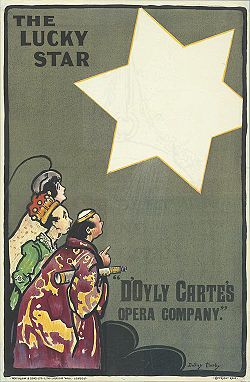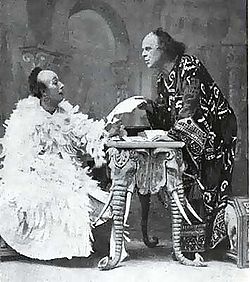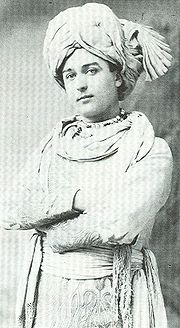
The Lucky Star
Encyclopedia



Comic opera
Comic opera denotes a sung dramatic work of a light or comic nature, usually with a happy ending.Forms of comic opera first developed in late 17th-century Italy. By the 1730s, a new operatic genre, opera buffa, emerged as an alternative to opera seria...
, in three acts, composed by Ivan Caryll
Ivan Caryll
Félix Marie Henri Tilkin , better known by his pen name Ivan Caryll, was a Belgian composer of operettas and Edwardian musical comedies in the English language...
, with dialogue by Charles H. Brookfield (revised by Helen Lenoir) and lyrics by Adrian Ross
Adrian Ross
For the NFL player see Adrian Ross Arthur Reed Ropes , better known under the pseudonym Adrian Ross, was a prolific writer of lyrics, contributing songs to more than sixty British musical comedies in the late 19th and early 20th centuries...
and Aubrey Hopwood (son of John Turner Hopwood
John Turner Hopwood
John Turner Hopwood was an English Liberal Party politician, and barrister.He was the only son of Robert and Elizabeth Hopwood . His paternal grandfather, also named Robert, was the second mayor of Blackburn...
). It was produced by the D'Oyly Carte Opera Company
D'Oyly Carte Opera Company
The D'Oyly Carte Opera Company was a professional light opera company that staged Gilbert and Sullivan's Savoy operas. The company performed nearly year-round in the UK and sometimes toured in Europe, North America and elsewhere, from the 1870s until it closed in 1982. It was revived in 1988 and...
and opened at the Savoy Theatre
Savoy Theatre
The Savoy Theatre is a West End theatre located in the Strand in the City of Westminster, London, England. The theatre opened on 10 October 1881 and was built by Richard D'Oyly Carte on the site of the old Savoy Palace as a showcase for the popular series of comic operas of Gilbert and Sullivan,...
on 7 January 1899 for a run of 143 performances.
The opera starred the usual Savoy Theatre cast from that period, including Walter Passmore
Walter Passmore
Walter Henry Passmore was an English singer and actor best known as the first successor to George Grossmith in the comic baritone roles in Gilbert and Sullivan operas with the D'Oyly Carte Opera Company....
, Henry Lytton
Henry Lytton
Sir Henry Lytton was an English actor and singer who was the leading exponent of the comic patter-baritone roles in Gilbert and Sullivan operas in the early part of the twentieth century...
, Robert Evett
Robert Evett
Robert Evett was an English singer, actor, theatre manager and producer.-Acting career:In 1892 Evett joined the D'Oyly Carte Opera Company on tour in The Vicar of Bray, playing the Reverend Henry Sandford, the tenor lead. In 1893, Evett added the role of Oswald in Haddon Hall...
, Ruth Vincent
Ruth Vincent
Ruth Vincent was an English opera singer and actress, best remembered for her performances in soprano roles of the Savoy Operas with the D'Oyly Carte Opera Company in the 1890s and her roles in the West End during the first decade of the 20th century, particularly her role as Sophia in Tom...
, Emmie Owen
Emmie Owen
Emmie Owen was an English opera singer and actress, best known for her performances in soprano roles of the Savoy Operas with the D'Oyly Carte Opera Company...
and Isabel Jay
Isabel Jay
Isabel Jay was an English opera singer and actress, best known for her performances in soprano roles of the Savoy Operas with the D'Oyly Carte Opera Company and in musical comedies...
. Direction was by R. Barker, choreography was by Willie Warde
Willie Warde
Willie Warde was an English actor, dancer, singer and choreographer. The son of a dancer, his first theatre work was with a dance company. He was engaged to arrange dances for London productions and was later cast as a comic actor in musical theatre...
, and costumes were designed by Percy Anderson
Percy Anderson
Percy Anderson was an English stage designer and painter, best known for his work for the D'Oyly Carte Opera Company, Sir Herbert Beerbohm Tree's company at His Majesty’s Theatre and Edwardian musical comedies.-Life and career:...
.
Background
The opera is based on L'étoile, written in 1877 by Eugène LeterrierEugène Leterrier
Eugène Leterrier was a French librettist.Leterrier worked at the Hôtel de Ville in Paris but then turned to the theatre. He mainly collaborated in writing libretti with Albert Vanloo. Their working relationship was productive and stress-free...
and Albert Vanloo
Albert Vanloo
Albert Vanloo was a Belgian librettist and playwright.Vanloo lived in Paris as a child and was attracted to the theatre. As a young student he began writing plays and opéra comique libretti, notably with Eugène Leterrier who remained his main collaborator until the latter's death in 1884...
, with additional material by Paul Verlaine
Paul Verlaine
Paul-Marie Verlaine was a French poet associated with the Symbolist movement. He is considered one of the greatest representatives of the fin de siècle in international and French poetry.-Early life:...
and music by Emmanuel Chabrier
Emmanuel Chabrier
Emmanuel Chabrier was a French Romantic composer and pianist. Although known primarily for two of his orchestral works, España and Joyeuse marche, he left an important corpus of operas , songs, and piano music as well...
. It is also based on The Merry Monarch, an American translation of L'étoile by J. Cheever Goodwin with music by Woolson Morse
Woolson Morse
Henry Woolson Morse , usually credited as Woolson Morse, was an American composer of musical theatre. Often working with librettist J. Cheever Goodwin, he produced several scores for Broadway productions in the 1890s....
, produced in 1890. Caryll used some of Chabrier's music in the first act.
The Lucky Star was the only Savoy Opera
Savoy opera
The Savoy Operas denote a style of comic opera that developed in Victorian England in the late 19th century, with W. S. Gilbert and Arthur Sullivan as the original and most successful practitioners. The name is derived from the Savoy Theatre, which impresario Richard D'Oyly Carte built to house...
where a woman plays a man's part. The piece has many other characteristics of Edwardian musical comedy
Edwardian Musical Comedy
Edwardian musical comedies were British musical theatre shows from the period between the early 1890s, when the Gilbert and Sullivan operas' dominance had ended, until the rise of the American musicals by Jerome Kern, Rodgers and Hart, George Gershwin and Cole Porter following World War I.Between...
, which had become popular on the London stage in the 1890s – broader comedy, a thin romance, bright tunes, comedians, a chorus of pretty girls, some risqué situations, a "coon" song
Coon song
Coon songs were a genre of music popular in the United States and around the English-speaking world from 1880 to 1920, that presented a racist and stereotyped image of blacks.-Rise and fall from popularity:...
, songs regarding news of the day, separate authors of dialogue and lyrics, and a star, Walter Passmore
Walter Passmore
Walter Henry Passmore was an English singer and actor best known as the first successor to George Grossmith in the comic baritone roles in Gilbert and Sullivan operas with the D'Oyly Carte Opera Company....
.
This half-musical, half-comic opera, though earning a good critical response and possessing a pleasant score and entertaining libretto, did not appeal strongly to the Savoy Theatre's audiences and was unable to achieve a long run. The Cartes discovered that they were presenting a good play at the wrong theatre.
Synopsis
King Ouf is a superstitious monarch. The King is informed by his astrologer Siroco that his destiny is linked with that of an itinerant painter named Lazuli, who is in love with the King's intended bride, the Princess Laoula. Siroco's astrological charts reveal that Lazuli's death will result in the King's. The King decrees that Siroco will be executed moments after the King's death, and so both have an interest in keeping Lazuli alive.Roles
- King Ouf the First (comic baritoneBaritoneBaritone is a type of male singing voice that lies between the bass and tenor voices. It is the most common male voice. Originally from the Greek , meaning deep sounding, music for this voice is typically written in the range from the second F below middle C to the F above middle C Baritone (or...
) – Walter PassmoreWalter PassmoreWalter Henry Passmore was an English singer and actor best known as the first successor to George Grossmith in the comic baritone roles in Gilbert and Sullivan operas with the D'Oyly Carte Opera Company.... - The Baron Tabasco, Ambassador-Extraordinary from King Mataquin (baritone) – Henry LyttonHenry LyttonSir Henry Lytton was an English actor and singer who was the leading exponent of the comic patter-baritone roles in Gilbert and Sullivan operas in the early part of the twentieth century...
- Siroco, the Astrologer Royal – Sydney Paxton (replaced by Fred Wright, Jr.)
- Tapioca, Private Secretary to Baron Tabasco (tenorTenorThe tenor is a type of male singing voice and is the highest male voice within the modal register. The typical tenor voice lies between C3, the C one octave below middle C, to the A above middle C in choral music, and up to high C in solo work. The low extreme for tenors is roughly B2...
) – Robert EvettRobert EvettRobert Evett was an English singer, actor, theatre manager and producer.-Acting career:In 1892 Evett joined the D'Oyly Carte Opera Company on tour in The Vicar of Bray, playing the Reverend Henry Sandford, the tenor lead. In 1893, Evett added the role of Oswald in Haddon Hall... - Kedas, a Police officer – Frank Manning
- Cancan, a Citizen – Leonard Russell
- Chamberlain – Charles Childerstone
- Princess Laoula, Daughter of King Mataquin (sopranoSopranoA soprano is a voice type with a vocal range from approximately middle C to "high A" in choral music, or to "soprano C" or higher in operatic music. In four-part chorale style harmony, the soprano takes the highest part, which usually encompasses the melody...
) – Ruth VincentRuth VincentRuth Vincent was an English opera singer and actress, best remembered for her performances in soprano roles of the Savoy Operas with the D'Oyly Carte Opera Company in the 1890s and her roles in the West End during the first decade of the 20th century, particularly her role as Sophia in Tom... - Aloës, Daughter of Tabasco and Lady-in-Waiting to the Princess (soprano) – Isabel JayIsabel JayIsabel Jay was an English opera singer and actress, best known for her performances in soprano roles of the Savoy Operas with the D'Oyly Carte Opera Company and in musical comedies...
- Maids of Honour: Oasis, Asphodel and Zinnia – Jessie Rose, Madge Moyse and Mildred Baker
- Adza, the Court Dancer – Katie Vesey
- Lazuli, a Travelling Painter (mezzo-sopranoMezzo-sopranoA mezzo-soprano is a type of classical female singing voice whose range lies between the soprano and the contralto singing voices, usually extending from the A below middle C to the A two octaves above...
, a woman portraying a man) – Emmie OwenEmmie OwenEmmie Owen was an English opera singer and actress, best known for her performances in soprano roles of the Savoy Operas with the D'Oyly Carte Opera Company... - Citizens, Guards, Courtiers, and Ladies-in-Waiting.
Musical numbers
- Overture
ACT I - A Public Square
- No. 1 - Opening Chorus - "Night is done, but it is not day, only a twilight, quiet and grey"
- No. 2 - Quartet - Laoula, Aloës, Tabasco & Tapioca - "Hush! hark! is anyone near? Hist! ha! can anyone hear?"
- No. 3 - Song - Laoula - "When I was a child of three, heigh-ho! Long ago! Happy as a child could be"
- No. 4 - Serenade - Lazuli - "Say little star, when the soft summer glow trembles and dies out of the skies"
- No. 5 - Trio - Laoula, Aloës, & Lazuli - "Of our disguise advantage take, he won't know who we are"
- No. 6 - Chorus - "Bring on our King, in a stately and solemn procession"
- No. 6a - Song - King & Chorus - "I'm a king in everything, I am glorious, great, and good"
- No. 7 - Finale Act I - "Young man, you have dared to strike the King!"
ACT II - Throne-Room in the King's Palace
- No. 8 - Opening Chorus, with Oasis & Asphodel - "Lolling in sinuous feminine fashion, over a downy divan"
- No. 9 - Song - Lazuli & Chorus - "There was a minstrel gay who at the break of day"
- No. 10 - Quintet - King, Siroco, Lazuli, Tabasco & Tapioca - "It's the husband, harsh and hated, as I formerly related"
- No. 11 - Chorus - Entrance of the Ambassador - "In a courtly train let us welcome with dutiful homage"
- No. 12 - Elopement Trio - Lazuli, Laoula & King - "Together, darling, let us roam, with staff and scrip and pocket-comb"
- No. 13 - Song - King & Chorus - "In an African land, that chiefly was sand, an Ostrich went his way"
- No. 14 - Finale Act II - "It's a shot! Then a lot! Did they pot him, yes or not? "
ACT III - A Summer-Room in the Palace
- No. 15 - Opening Chorus - "When the tramp, tramp, tramp of our military march is heard"
- No. 16 - Song - Tapioca - "Dreaming in the dark, your vision comes upon my lonely slumber"
- No. 17 - Song - King & "Coons" - "Merry little darkie's very kind remark is: 'Life in the old dog yet!'"
- No. 18 - Duet - Laoula & Lazuli - "There lived in a cage two turtle doves, in happy contentment of mind"
- No. 19 - Wedding Chorus - "In courtly train, let us welcome, with dutiful homage"
- No. 20 - Finale - "Let us march away, brave and gay our display, for 'tis plain to see joyful all we should be"

